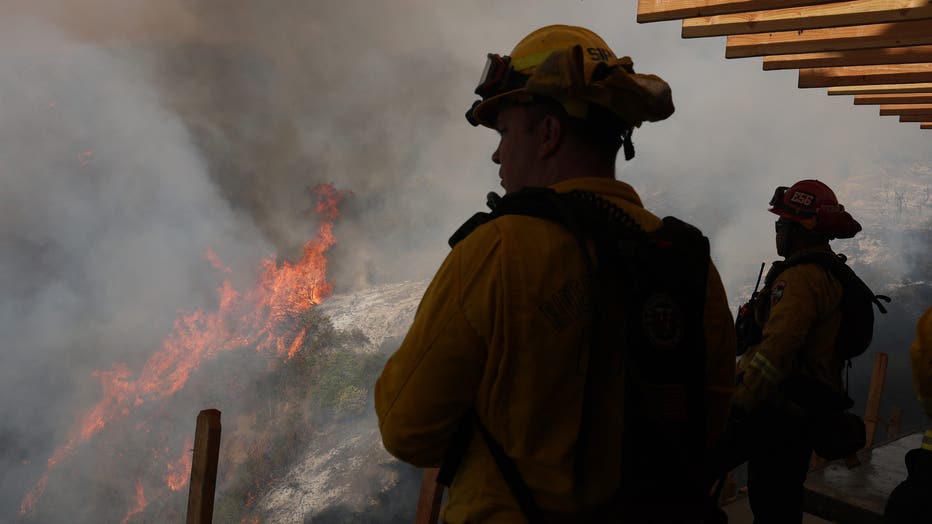Feds take lead in determining cause of California fires
The federal Bureau of Alcohol, Tobacco, Firearms and Explosives will take the lead in investigating the exact cause of multiple fires that have swept through the Los Angeles area.
Los Angeles Police Chief Jim McDonnell announced the news at a briefing Saturday morning. He said the ATF will serve as lead agency of a newly formed Los Angeles Regional Wildfire Investigative Task Force – a team of local, state and federal agencies that will "investigate the cause of these fires and to see if there's any connection between them."
LIVE: Palisades Fire burns home in Brentwood as more evacuations underway
"They have tremendous resources and expertise and can bring in resources from across the country to do their investigation," McDonnell said. "So we're very thankful for them and their resources."

Firefighters monitor the Palisades Fire as it burns through the area on January 10, 2025 in Los Angeles, California. (Photo by Justin Sullivan/Getty Images)
The fires burned for a fifth day Saturday as more evacuations were ordered and the Palisades Fire spread to Brentwood. The Eaton fire was only 15% contained as of Saturday morning and had destroyed more than 7,000 homes, businesses, buildings and cars.
What caused the fires?
Investigators are considering an array of possible ignition sources.
The exact cause of each fire is still under investigation, but they were fueled by extreme drought conditions, combined with the supersized Santa Ana winds that whipped flames and embers at 100 mph – much faster than usual.
RELATED: What caused the California fires? What we know
Add on weather whiplash that grew tons of plants in downpours, then record high temperatures that dried them out to make easy-to-burn fuel. There was also a plunging and unusual jet stream, and lots of power lines flapping in those powerful gusts.
Experts say that’s what turned the wildfires into a deadly urban conflagration.
While lightning is the most common source of fires in the U.S., according to the National Fire Protection Association, investigators were able to rule that out quickly. There were no reports of lightning in the Palisades area or the terrain around the Eaton Fire.
The next two most common causes: fires intentionally set, and those sparked by utility lines.
Eaton fire latest: 7,000 structures damaged; progress 'static,' officials say
A man with a blowtorch was detained in the Woodland Hills area, but law enforcement said there wasn’t enough evidence to arrest him for arson. He was held for a parole violation.
SCE reports incident to regulators
Utilities are required to report to the California Public Utilities Commission when they know of "electric incidents potentially associated with a wildfire."
On Friday, Southern California Edison filed a report with the CPUC related to the Eaton Fire in the hills near Pasadena, an area the utility serves.
Firefighter gives update as blaze moves towards Brentwood
The Palisades Fire moved swiftly towards Brentwood on Saturday as firefighters continued to try to get a handle on the deadly blaze.
Edison said it has not received any suggestions that its equipment was involved in the ignition of that fire, but that it filed the report with state utilities regulators out of "an abundance of caution" after receiving evidence preservation notices from insurance company lawyers.
California fires map: Los Angeles evacuation orders, warnings
Southern California Edison filed a separate report Friday evening noting it had a downed conductor and relay of circuit around the same time and place that the Hurst fire started in the Sylmar area.
RELATED: Newsom calls for investigation into LA water supply issues during California wildfires
John Lentini, owner of Scientific Fire Analysis in Florida, who has investigated large fires in California, said the size and scope of the blaze doesn’t change the approach to finding out what caused it.
"This was once a small fire," Lentini told the Associated Press. "People will focus on where the fire started, determine the origin and look around the origin and determine the cause."
Red flag, wind warnings return
Saturday forecast: Moderate to strong winds return
Critical fire conditions remain as wind speeds are expected to increase Saturday night and into Sunday, Monday and Tuesday. FOX LA's Maria Quiban has the latest forecast.
Moderate to strong winds return later Saturday, increasing fire danger as firefighters continue to battle deadly fires.
Although they won’t be as strong as what we saw earlier this week, wind gusts are still expected to get 60-65 mph later tonight and into Sunday, Monday and Tuesday.
RELATED: Saturday forecast: Moderate to strong winds return
Expect higher winds Saturday night through Sunday morning, and again Monday through Wednesday.

